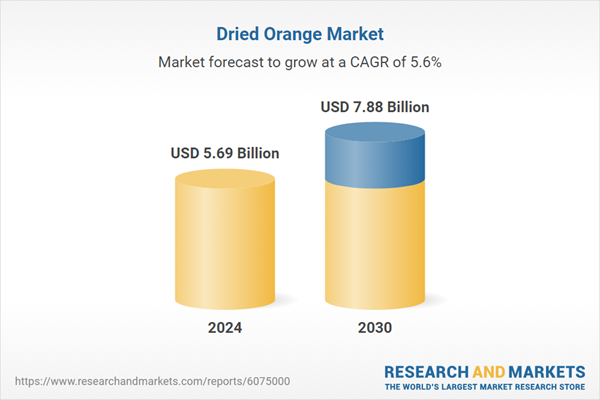Speak directly to the analyst to clarify any post sales queries you may have.
10% Free customizationThis report comes with 10% free customization, enabling you to add data that meets your specific business needs.
The rising demand for energy-dense, nutrient-rich foods further supports market growth, with dried oranges offering a naturally concentrated source of essential nutrients. Their popularity continues to rise with expanding use in teas, snack mixes, skincare, and décor. Innovation by new entrants introducing novel uses for dried oranges is increasing product visibility and boosting consumer interest. Increased global orange production, particularly from Brazil, is expected to support market supply and expansion in the coming years.
Key Market Drivers
Increasing Health Consciousness and Demand for Natural Snacks
The rising focus on health and nutrition is a primary growth driver for the dried orange market. Consumers are increasingly opting for snacks that are natural, minimally processed, and packed with health benefits. Dried oranges meet these expectations with their high vitamin C, antioxidant, and fiber content - nutrients known for supporting immune function, digestion, and general wellness. As a clean-label product, dried oranges align with the trend toward simple ingredient lists and transparency in food labeling. Free from artificial preservatives or added sugars, they appeal to consumers seeking wholesome snack options. This shift has intensified post-COVID-19, with immune health becoming a top priority. As consumers continue to replace processed snacks with healthier alternatives, demand for dried oranges is expected to rise consistently, driven by both nutritional benefits and convenience.Key Market Challenges
Seasonal Availability and Supply Chain Instability
The dried orange market faces challenges due to the seasonal and regional nature of orange production, which can lead to supply fluctuations. Orange cultivation is concentrated in areas with favorable climates - such as Brazil, the U.S., Spain, and China - making production susceptible to environmental disruptions like droughts, frosts, and hurricanes.Such factors can significantly impact harvest yields and raw material availability. Furthermore, global supply chain vulnerabilities - including rising freight costs, port delays, and labor shortages - can disrupt the transport of oranges to drying and processing facilities. These logistical issues can result in product shortages or cost spikes, affecting availability and pricing. The unpredictability of weather patterns and shipping constraints continues to be a key barrier to consistent production and timely distribution.
Key Market Trends
Rising Popularity of Natural and Clean-Label Products
A major trend shaping the dried orange market is the increasing consumer shift toward clean-label and naturally processed food products. Consumers are prioritizing health and sustainability, leading them to seek out items with fewer ingredients and minimal processing. Dried oranges, typically containing just fruit or minimal natural additives, are favored for their authenticity and transparency. The appeal of such products extends beyond nutrition - shoppers also consider environmental impact and product integrity. As a result, manufacturers are introducing organic, preservative-free variants and embracing sustainable packaging to meet consumer expectations. The demand for “real food” options with clear health benefits has spurred innovation in dried orange offerings, with brands focusing on functional benefits, aesthetic appeal, and ethical sourcing.Key Market Players
- Bella Viva Orchards
- Foodchem International Corporation
- Nafoods Group
- Woodland Foods, Ltd.
- Natural Moreish Pty Ltd.
- Mojan Dried Fruit Company
- Medikonda Agro Farms Private Limited
- Siam Oriental Food and Beverage Co., Ltd.
- Nuts.com, Inc.
- Nim’s Fruit Crisps
Report Scope:
In this report, the global Dried Orange Market has been segmented into the following categories, in addition to the industry trends which have also been detailed below.Dried Orange Market, By Type:
- Slices
- Peel
- Powder
- Others
Dried Orange Market, By Application:
- Food and Beverage
- Cosmetics
- Others
Dried Orange Market, By Distribution Channel:
- Online
- Offline
Dried Orange Market, By Region:
- North America
- United States
- Canada
- Mexico
- Europe
- France
- Germany
- Spain
- Italy
- United Kingdom
- Asia-Pacific
- China
- Japan
- India
- Vietnam
- South Korea
- Middle East & Africa
- South Africa
- Saudi Arabia
- UAE
- Turkey
- South America
- Brazil
- Argentina
- Colombia
Competitive Landscape
Company Profiles: Detailed analysis of the major companies present in the global Dried Orange Market.Available Customizations:
With the given market data, the publisher offers customizations according to a company's specific needs. The following customization options are available for the report.Company Information
- Detailed analysis and profiling of additional market players (up to five).
This product will be delivered within 1-3 business days.
Table of Contents
Companies Mentioned
- Bella Viva Orchards
- Foodchem International Corporation
- Nafoods Group
- Woodland Foods, Ltd.
- Natural Moreish Pty Ltd.
- Mojan Dried Fruit Company
- Medikonda Agro Farms Private Limited
- Siam Oriental Food and Beverage Co., Ltd.
- Nuts.com, Inc.
- Nim’s Fruit Crisps
Table Information
| Report Attribute | Details |
|---|---|
| No. of Pages | 185 |
| Published | April 2025 |
| Forecast Period | 2024 - 2030 |
| Estimated Market Value ( USD | $ 5.69 Billion |
| Forecasted Market Value ( USD | $ 7.88 Billion |
| Compound Annual Growth Rate | 5.6% |
| Regions Covered | Global |
| No. of Companies Mentioned | 10 |









